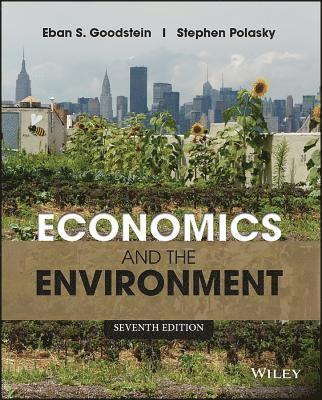
- Format
- Häftad (Paperback / softback)
- Språk
- Engelska
- Antal sidor
- 544
- Utgivningsdatum
- 2014-04-04
- Upplaga
- 7th Edition
- Förlag
- John Wiley & Sons Inc
- Illustrationer
- illustrations
- Dimensioner
- 234 x 190 x 31 mm
- Vikt
- Antal komponenter
- 1
- ISBN
- 9781118539729
- 975 g
Economics and the Environment
Kundrecensioner
Fler böcker av författarna
-
Natural Capital
Peter Kareiva, Heather Tallis, Taylor H Ricketts, Gretchen C Daily, Stephen Polasky
In 2005, The Millennium Ecosystem Assessment (MA) provided the first global assessment of the world's ecosystems and ecosystem services. It concluded that recent trends in ecosystem change threatened human wellbeing due to declining ecosystem serv...
-
Nature's Frontiers
Richard Damania, World Bank, Stephen Polasky, Mary Ruckelshaus
This report examines the use of natural capital (natural resources and services) around the world. It finds that most countries are using these resources inefficiently, and closing these efficiency gaps can address many of the world's pressing eco...
Övrig information
Eban Goodstein is Director of the Bard Center for Environmental Policy and Director at The National Teach-In. He received his B.A. from Williams College and Ph.D. from University of Michigan. Prior to Directing the Bard Center for Environmental Policy, Goodstein had a 20-year career as a Professor of Economics at Lewis & Clark and Skidmore Colleges. Goodstein also led the National teach-In on Global Warming Solutions, coordinating educational events at over 2500 colleges, universities, high schools and other institutions across the country. He is the author of a college textbook, Economics and the Environment, (John Wiley and Sons: 2010) now in its sixth edition; Fighting for Love in the Century of Extinction: How Passion and Politics Can Stop Global Warming (University Press of New England: 2007); and The Trade-off Myth: Fact and Fiction about Jobs and the Environment (Island Press: 1999). Articles by Goodstein have appeared in among other outlets, The Journal of Environmental Economics and Management, Land Economics, Ecological Economics, and Environmental Management. His research has been featured in The New York Times, Scientific American, Time, Chemical and Engineering News, The Economist, USA Today, and The Chronicle of Higher Education. He serves on the editorial board of Sustainability: The Journal of Record, and Environment, Workplace and Employment, is on the Steering Committee of Economics for Equity & the Environment, and is a Member Scholar at the Center for Progressive Reform.
Innehållsförteckning
Preface Chapter 1: Four Economic Questions about Global Warming Chapter 2: Ethics and Economics Chapter 3: Pollution and Resource Degradation as Externalities Chapter 4: The Efficiency Standard Chapter 5: Measuring the Benefits of Environmental Protection Chapter 6: Measuring the Costs of Environmental Protection Chapter 7: The Safety Standard Chapter 8: The Sustainability Standard Chapter 9: Measuring Sustainability Chapter 10: Natural Resources and Ecosystem Services Chapter 11: Is More Really Better? Consumption and Welfare Chapter 12: The Political Economy of Environmental Regulation Chapter 13: An Overview of Environmental Legislation Chapter 14: The Regulatory Record: Achievements and Obstacles Chapter 15: Incentive-Based Regulation: Theory Chapter 16: Incentive Based Regulation: Practice Chapter 17: Promoting Clean Technology: Theory Chapter 18: Energy and the Future Chapter 19: Poverty, Population, and the Environment Chapter 20: Environmental Policy in Poor Countries Chapter 21: The Economics of Global Agreements
Du kanske gillar
-
Peak Human
Johan Norberg
Häftad -
Peak Human
Johan Norberg
Inbunden -
Atomic Habits
James Clear
Trade paperback (UK) -
Leaders Eat Last
Simon Sinek
Häftad -
Orbital
Samantha Harvey
Häftad
